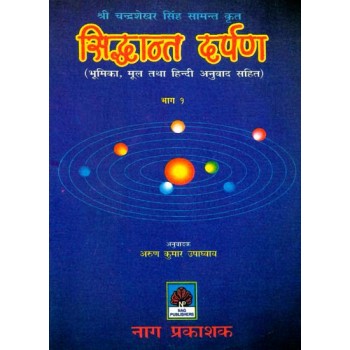Siddhant Darpan
| Price: | Rs.400.00 |
Detail Of Siddhant Darpan
| ISBN | 8170813425 |
| Pages | 608 |
| Language: | Sanskrit Text with Hindi Translation |
| Product Code: | 1 |
| Size(in cm): | 9.0 inch X 6.0 inch cm |
| Weight(in grams): | 765(approx) |
Description:
Introduction
In his Brihat Samhita, Varaha mihira enumerates the requisite qualification of an astronomer. According to him, an astronomer should be able to explain the differences in the various Siddhantas, to demonstrate with the help of instrument of moment of the Sun’s turning to the north or to the south, and of his entering the prime vertical and the meridian, and to make calculation agree with observation.
Unfortunately, the true science of astronomy has been ousted by the pseudo science of astrology, whose votaries are to be found in almost every town and village of India at the present day. No doubt, there are men who have committed to memory some stray couplets from Siddhantas, and can perhaps compute an almanac with the aid of tables. But, as Bhaskara has well said, an astronomer without knowledge of spherics is what food is without clarified butter, a monarchy without its monarch, and an assembly without a speaker.
Astronomy as a science is not cultivated by those whose business it should be to do so. They would rather learn to read the thoughts of simple persons and pretend to predict future events, than dive into the mysteries of Kalpas and Yugas, for less observe the heavens. Those that have a desire to study the science have no means of doing it, while those that have the means have no desire to watch the movement of the planets. Our students of the English college are busy in cramming the answer to expected questions and our university men are too busy to have leisure to think about the revival of the indigenous science and arts of the country. It is not strange therefore that the mathematical science of astronomy has been relegated to the half reed, illiterate, fortunetellers who are not ashamed to assume the title of mathematician. For, the name mathematician has been degraded to mean only an astrologer.
In this state of indigenous science, it is singular to find a man born and brought up in the recesses of the hills of Orissa, far removed from all educational activity and the influence of imported western civilization, silently trading his way into such a difficult science as mathematics. It is a unique experience in the department of national development to find a man really striving after knowledge for its own sake, under difficulties whose magnitude is no less startling than the boldness of his attempts.
This is my apology for bringing before the public, a Sanskrit work written entirely in the way of our ancient Siddhantas and never meant to see the light. It is the lifelong labour of Chandrasekhara Simha Samanta of Orissa, written in a language which few men care to study in these days of English education.
Modern Europe boasts of discoveries, one of which alone would have been the glory of the past. The science of astronomy has been developed to so great an extent as to shed a luster on the bright records of original and patient researchers in the domain of Physical Science. The telescope, the spectroscope, and last but not least, the art of photography, have gone hand in hand in the service of diligent workers. In these days of “scopes” and “meters” it may be thought useless to put forward the poor work of a Hindu whose education is in no way superior to that of an astronomer of pre telescopic Europe. And there are men, too, who have thought that much nonsense has already been written about him.
Let them but calmly take stock of the present state of Hindu astronomy. Let them find out a couple of mathematicians, brought up wholly in Sanskrit studies, who can intelligently attack the intricate calculations of a solar eclipse. Nor is there any noticeable endeavour to revive the science. What with nature apathy, and what with want of encouragement by endowments, no addition to the stock of the world’s knowledge has been made by my countrymen for many a long year. If in these circumstances something, however poor, is laid before us, something, however crude, is evolved from within, we should rejoice over it.
Reviews (0)
Write a review
Your Name:Your Review:
Note: HTML is not translated!
Rating: Bad Good
Enter the code in the box below:



 |
| 